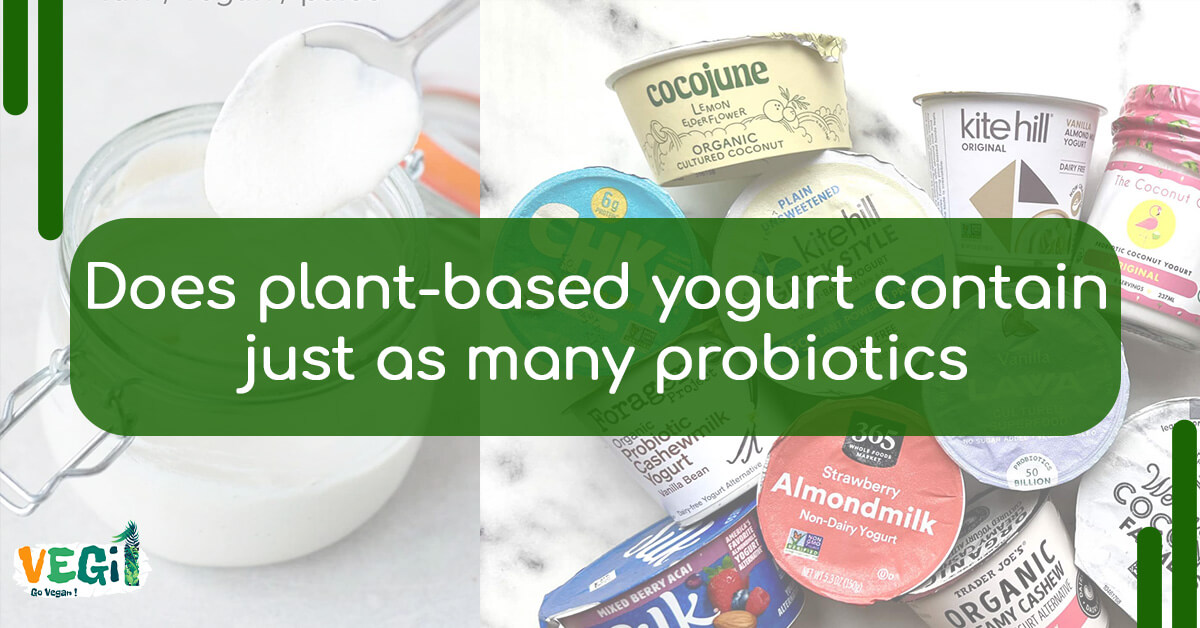Does plant-based yogurt contain just as many probiotics

As a vegan, I understand the challenges and questions that can arise when adopting a plant-based lifestyle. One common question is whether plant-based yogurt provides the same amount of probiotics as dairy yogurt.
Probiotics are beneficial bacteria that promote gut health; they play a crucial role in maintaining a healthy gut, and it’s important to understand how we can incorporate them into our vegan diet.
In this article, we’ll explore the world of plant-based yogurt, its probiotic content, and its benefits for our overall well-being.
Join me as we uncover the truth about probiotics in vegan yogurts.
Let’s understand if plant-based yogurt has just as many probiotics as its dairy counterpart!
In this article you will read:
Understanding Probiotics
Before diving into plant-based yogurt, let’s first understand what probiotics are and why they are important.
Probiotics are live microorganisms (tiny living organisms) that are beneficial for your body, especially your digestive system. They’re often referred to as “friendly bacteria” because they help maintain a healthy balance of bacteria in our gut, aiding digestion and promoting a healthy digestive system.
You see, our bodies are home to trillions of good and bad bacteria. When the balance between these bacteria gets out of whack, it can lead to digestive issues, weakened immunity, and other health problems. But that’s where probiotics come to the rescue!
Probiotics can help improve digestion, boost your immune system, and even enhance nutrient absorption from the food you eat.
These friendly bacteria can be found in various fermented foods, including yogurt.
Benefits of Probiotics in a Vegan Diet
Incorporating probiotics into your vegan diet can offer several benefits. Here are some of the advantages of consuming probiotics:
- Improved Digestive Health: Probiotics help maintain a healthy balance of gut bacteria, which aids digestion and prevents issues like constipation and bloating.
- Enhanced Immune System: The majority of our immune system resides in our gut. Probiotics support a healthy immune response, helping to fend off pathogens and neutralize harmful substances.
- Increased Nutrient Absorption: Probiotics assist in breaking down complex nutrients, making them more easily absorbed by the body. Additionally, they aid in the production of vitamins and other beneficial compounds in our bodies.
- Reduced Inflammation: Studies have shown that probiotics can help reduce inflammation in the body, which is linked to various chronic diseases.
- Gut-Brain Connection: The gut-brain axis is a bidirectional communication system between the gut and the brain. Probiotics can influence this connection positively, potentially benefiting mental health and well-being.
Additionally, Probiotics contribute healthy gut microbiome, which is crucial for proper digestion. - Potential Weight Management: Some research suggests that certain probiotic strains may play a role in weight management by influencing metabolism and reducing appetite.
Types of Probiotics in Plant-Based Yogurt
Plant-based yogurts contain a variety of probiotic strains similar to their dairy counterparts. Some common strains you may find in vegan yogurts include Lactobacillus acidophilus, Lactobacillus casei, Bifidobacterium bifidum, and Streptococcus thermophilus.
These strains contribute to a healthy gut microbiome and provide the same benefits as those found in dairy yogurts.
Does Vegan Yogurt Have Probiotics? Lets Find Out!
Probiotics in Dairy vs. Plant-Based Yogurt
Now, let’s address the question at hand: does plant-based yogurt contain just as many probiotics as dairy yogurt? The answer is a resounding yes!
While dairy yogurt is a traditional source of probiotics, plant-based yogurts can offer an equally impressive probiotic profile.
Vegan yogurt is a popular choice for those looking to incorporate probiotics into their diet. Various non-dairy yogurts are made from plant-based ingredients like soy, coconut, or almond milk and contain live and active cultures that promote gut health.
To give you a better understanding, let’s compare the probiotic content of different types of vegan yogurt with dairy yogurt:
| Yogurt Type | Probiotic Strains |
|---|---|
| Dairy Yogurt | Dairy yogurt typically contains well-known probiotic strains such as Lactobacillus acidophilus, Bifidobacterium lactis, and Streptococcus thermophilus. |
| Soy Yogurt | Contains specific strains of probiotics, such as Lactobacillus acidophilus and Bifidobacterium lactis, similar to those found in dairy yogurt. |
| Coconut Yogurt | Some coconut yogurts may contain probiotics, such as Lactobacillus acidophilus and Bifidobacterium lactis, similar to those found in dairy yogurt. |
| Almond Yogurt | Like coconut yogurt, some almond yogurts may contain probiotics, such as Lactobacillus acidophilus and Bifidobacterium lactis. |
| Oat Milk Yogurt | May contain strains like Lactobacillus acidophilus, Bifidobacterium lactis, and Streptococcus thermophilus. The specific strains may vary depending on the brand. |
As you can see, The specific strains may vary depending on type of yogurt, but overall, vegan yogurts are a reliable source of probiotics.

Vegan Yogurt Brands with Probiotics
Let’s talk about the fantastic world of vegan yogurt packed with those awesome probiotics.
Here are a few types of vegan yogurts that will make your taste buds and your gut happy:
- Almond Milk Yogurt: Creamy and delicious, almond milk yogurt is popular with vegans. Look for brands that mention live and active cultures on the label, ensuring you get those beneficial probiotics. One tasty option is the “Almond Dream Non-Dairy Yogurt” – check it out on Amazon: [Almond Dream Non-Dairy Yogurt on Amazon]
- Coconut Milk Yogurt: If you’re a fan of tropical vibes, coconut milk yogurt is for you. It has a rich and creamy texture with a subtle coconut flavor. Look for brands that specifically mention probiotics or live cultures to get your dose of gut-friendly goodness. Give “So Delicious Dairy Free Coconut Milk Yogurt” a try – you can find it on Amazon: [So Delicious Dairy Free Coconut Milk Yogurt on Amazon]
- Soy Milk Yogurt: Soy milk yogurt is another fantastic option for plant-based probiotics. It has a creamy texture and is often available in various flavors. Look for brands highlighting their probiotic content to ensure you’re getting the good stuff. “Silk Dairy-Free Yogurt Alternative” is worth a taste – find it on Amazon: [Silk Dairy-Free Yogurt Alternative on Amazon]
Remember, these are just a few examples, and plenty of other brands and flavors are out there. Explore your local grocery store or check out the Amazon links to find the ones that suit your taste buds and dietary needs.
The Best Vegan Yogurt Brands
| Yogurt Brand | Probiotic Strains |
|---|---|
| Silk Almondmilk Yogurt Alternative | Lactobacillus acidophilus, Bifidobacterium bifidum |
| Chobani Non-dairy Coconut Yogurt | Lactobacillus acidophilus, Streptococcus thermophilus |
| Daiya Greek Yogurt Alternative | Lactobacillus acidophilus, Bifidobacterium bifidum |
| Yoso Dairy-free Yogurt | Lactobacillus acidophilus, Lactobacillus casei |
| Kite Hill Dairy-free Yogurt | Lactobacillus acidophilus, Lactobacillus casei |
These brands offer a variety of flavors and textures, allowing you to find the perfect option to suit your taste preferences.
Factors Affecting Probiotic Content in Plant-Based Yogurt
While plant-based yogurts can provide a rich source of probiotics, it’s essential to consider a few factors that may affect their content.
- The probiotic content can vary depending on the manufacturing process and the specific brand. It’s important to choose a reputable brand that prioritizes the inclusion of high-quality probiotic strains in their products.
- Additionally, the storage and handling of the yogurt can also impact the viability of the probiotics.
- To ensure you’re getting the full benefits, follow the storage instructions provided by the manufacturer.
- Remember to check the label for specific probiotic strains and choose brands that align with your dietary needs and preferences.

Making Your Own Plant-Based Yogurt
Vegan yogurt is typically made from plant-based ingredients, such as nuts (almonds, cashews), coconuts, soybeans, oats, and peas. The process of making vegan yogurt involves fermenting these ingredients with beneficial bacteria, which convert sugars into lactic acid. This fermentation process gives yogurt its tangy flavor and creamy texture.
To make your own vegan yogurt at home, you can use canned coconut milk or plant-based milk as a base. Add a vegan yogurt starter (Rejuvelac) or probiotic capsules containing live cultures to initiate the fermentation process. Let it sit at room temperature for a specified period, usually 24-48 hours, until it thickens and develops a yogurt-like consistency. Refrigerate it to stop the fermentation process, and enjoy your homemade vegan yogurt!
Here’s a simple recipe for homemade coconut yogurt:
Ingredients:
- 1 can of coconut milk (full fat, organic)
- 1 plant-based probiotic capsule
Instructions:
- Pour the entire can of coconut milk into a mixing bowl and whisk until smooth.
- Open the plant-based probiotic capsule and add the powder to the coconut milk. Whisk again to combine thoroughly.
- Transfer the mixture to a mason jar or cover with cheesecloth or plastic wrap.
- Place the jar in a cool, dry place, such as the top of your fridge or a cabinet, and let it sit for 24-48 hours to allow the yogurt to ferment.
- Once fermented, move the yogurt to the fridge to cool for 1-2 hours before enjoying it.
- Feel free to experiment with different plant-based milks and probiotic strains to create your own unique yogurt flavors.
Also, You can see the recipe and video of making this delicious vegan yogurt with homemade Rejuvelac here.
How to Make Vegan Yogurt at Home Healthy & Dairy-Free
Other Sources of Probiotics
While plant-based yogurt is a fantastic source of probiotics, it’s not the only option available. There are many other vegan-friendly sources of probiotics that you can incorporate into your diet. Here are a few examples:
Fortunately, there are many delicious non-dairy sources of probiotics for vegans and vegetarians Let’s explore some of the best vegan probiotic sources:
Fermented Foods
Fermented foods are excellent sources of probiotics. They undergo a fermentation process that allows beneficial bacteria to thrive. Some popular examples include:
- Tempeh: A fermented soy product that is not only a great source of probiotics but also a rich source of protein.Tempeh is used as a meat substitute in many vegetarian dishes
- Miso: A traditional Japanese seasoning made from fermented soybeans. It adds a savory flavor to soups, dressings, and marinades.
- Kimchi: A traditional Korean dish made from fermented vegetables, such as cabbage and radishes. It is packed with probiotics and adds a tangy and spicy kick to your meals.
- Sauerkraut: Fermented cabbage that is commonly used as a condiment. It is rich in probiotics and adds a crunchy texture to sandwiches and salads.
- Fermented pickles: Pickles made through the fermentation process are a delicious way to add probiotics to your diet.
- Kombucha: A fermented tea drink that is fizzy and packed with probiotics. It comes in various flavors and is a refreshing way to consume probiotics.
- Sourdough bread: Made through a natural fermentation process, sourdough bread contains beneficial bacteria and can be a tasty addition to your meals.
Incorporating these probiotic-rich foods into your diet can help diversify your gut microbiome and provide additional health benefits.
Going Vegan: A Win-Win for Probiotics and More
By adopting a vegan lifestyle, you’re not only contributing to animal welfare and environmental sustainability but also ensuring a healthy intake of probiotics. Vegan diets are rich in fiber, which acts as a prebiotic, fueling beneficial gut bacteria growth. This, combined with the probiotics found in vegan sources, creates an optimal environment for a gut microbiome.
So, rest assured that you won’t lose anything by going vegan. Probiotics can be easily obtained from vegan sources, including fermented foods and plant-based yogurts. If you’re new to a vegan diet or looking to incorporate more probiotics into your diet, start by adding small amounts of fermented foods or vegan yogurt to your meals. Monitor how your body responds and adjust accordingly.
In conclusion
Plant-based yogurts can indeed contain just as many probiotics as their dairy counterparts. These yogurts offer a range of probiotic strains that contribute to a healthy gut microbiome and provide numerous health benefits.
Whether you choose to purchase vegan yogurts from reputable brands or make your own at home, you can enjoy the benefits of probiotics while adhering to a plant-based lifestyle.
So go ahead and indulge in a delicious plant-based yogurt knowing that you’re also nourishing your gut with beneficial probiotics.
Share Your Experience
Have you tried incorporating vegan probiotics into your diet? How has it benefited your overall well-being? We’d love to hear about your experiences and any feedback you have. Share your thoughts in the comments below and join the conversation!










